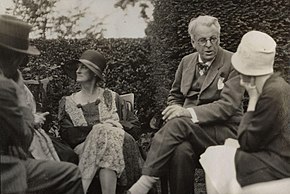 [PJ] Lately, I’ve been revisiting the collected works of my favorite poet, the Irish laureate W.B. Yeats, and as always find myself mesmerized by his mastery of order and form and his meditative profundity. The American poet and critic Randall Jarrell once said that "A good poet is someone who manages, in a lifetime of standing out in thunderstorms, to be struck by lightning five or six times; a dozen or two dozen times and he is great." Yeats has been luminously charred by poetic lightning more times than I can count.
[PJ] Lately, I’ve been revisiting the collected works of my favorite poet, the Irish laureate W.B. Yeats, and as always find myself mesmerized by his mastery of order and form and his meditative profundity. The American poet and critic Randall Jarrell once said that "A good poet is someone who manages, in a lifetime of standing out in thunderstorms, to be struck by lightning five or six times; a dozen or two dozen times and he is great." Yeats has been luminously charred by poetic lightning more times than I can count.One poem that has stayed with me over the years and continues to resonate is "The Municipal Gallery Revisited," a masterpiece composed in a style known as ottava rima, a form catering to reminiscence and reflection with a long history in Italian and English verse. Yeats is studying the portraits of his friends that hang in the Gallery and recalling the qualities that made each one memorable, even extraordinary. Three in particular stand out: Kevin O’Higgins, Ireland’s first minister of justice, assassinated by an IRA bullet; Yeats’ benefactress and collaborator Lady Augusta Gregory; and John Synge, the most famous and controversial playwright of the Irish literary renaissance of the early 20th century.
We might say that O’Higgins personified courage and patriotism; Lady Gregory, generosity of spirit; and Synge, the fearless creative temperament — in Yeats’ words, a triumvirate representing "Irish history in their lineaments." All three, for Yeats, were exemplars of moral heroism and high intelligence, truly splendid people, of whom he writes:
And I am in despair that time may bring
Approved patterns of women or of men
But not that selfsame excellence again.
These were the qualities that Yeats felt made life bearable, that gave hope and sustenance to the troubled and dispossessed mind of contemporary man living in an increasingly desolate and broken world. Friendship with good and intelligent people, people of courage, generosity, and creative spirit, was the perfume of existence in a malodorous era.
This is something I can well understand since my own friends — those steadfast souls who struggle for clarity of insight and are concerned for the health of the wider community — are few but cherished. They are better than I am but make me better than I was. I ask myself what this handful of admirable people have in common and conclude that the attributes they share are easy to identify and enumerate.
They try not to commit harm. Although they may not be doctors, they have internalized the Hippocratic Oath. They will put themselves in harm’s way to counter and mitigate harm to others. They eschew violence. In matters of public policy — for example, considerations of public health, economic realities, political questions, and environmental factors — they do not act or pronounce without first analyzing the relevant issues dispassionately. They are capable of arriving at resolutions that may thwart or neutralize their wishes or emotional bent by going where the evidence appears to lead, not where their desires may take them. They are capable of change. They are influenced by derivable facts, not by theories and myths.
This is another way of saying that they believe in the existence of truth — not your truth or my truth, not group truth or ideological truth, but discernible truth — unlike that first postmodernist Pontius Pilate who washed his hands of the whole matter. At the same time, they know that no human being enjoys a divine lien on truth, but that by the honest exertion of their efforts, they can arrive at what we may call credible verisimilitude.
I admire these people because they think as individuals, because they seek objective evidence that can confirm or disconfirm the positions they adopt, because they are committed to upholding, in the words of John Locke, "life, liberty, and estate," which informed the American Declaration of Independence, and because they are trustworthy and do not betray their friends — or their principles. They are the remnant of better times. I do not name them, but they know who they are.